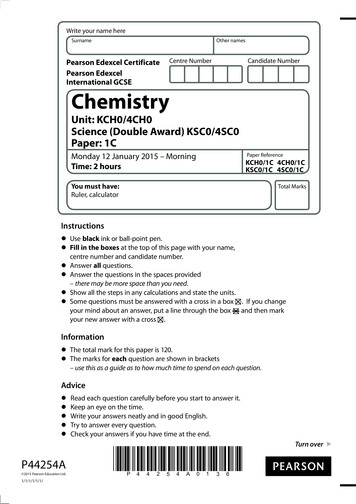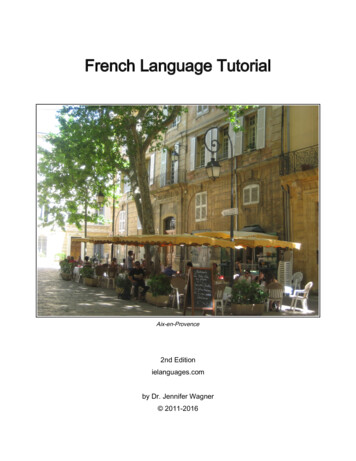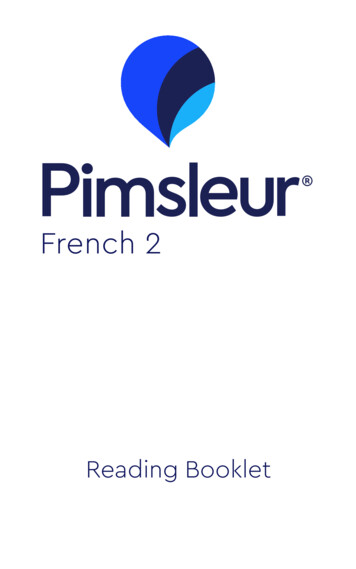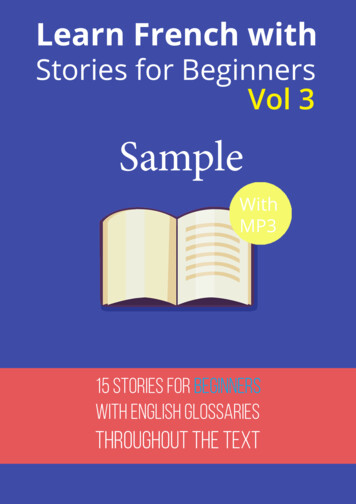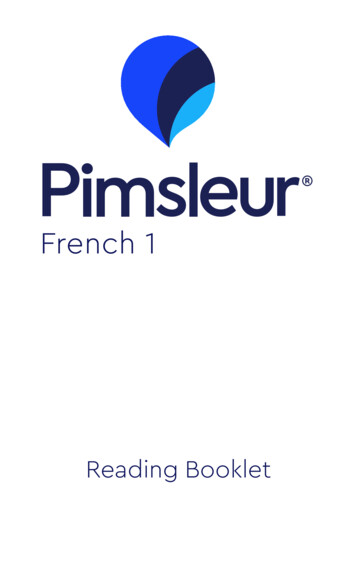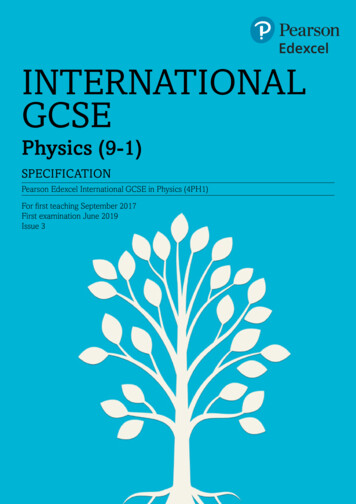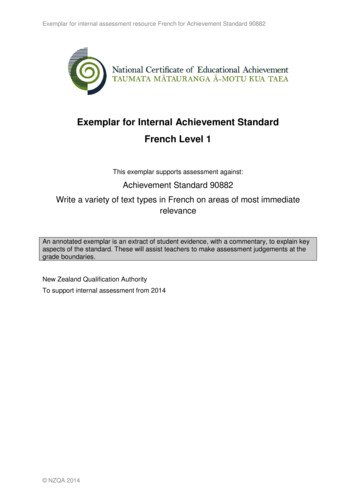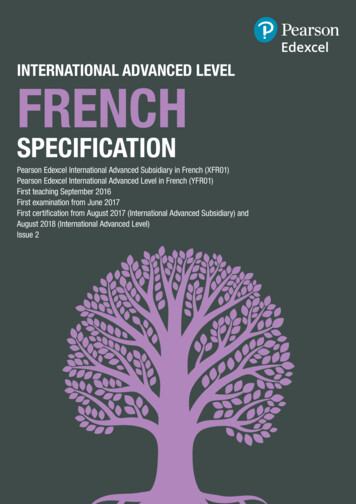
Transcription
INTERNATIONAL ADVANCED LEVELFRENCHSPECIFICATIONPearson Edexcel International Advanced Subsidiary in French (XFR01)Pearson Edexcel International Advanced Level in French (YFR01)First teaching September 2016First examination from June 2017First certification from August 2017 (International Advanced Subsidiary) andAugust 2018 (International Advanced Level)Issue 2
Edexcel, BTEC and LCCI qualificationsEdexcel, BTEC and LCCI qualifications are awarded by Pearson, the UK’s largest awardingbody offering academic and vocational qualifications that are globally recognised andbenchmarked. For further information, please visit our qualification website atqualifications.pearson.com. Alternatively, you can get in touch with us using the details onour contact us page at qualifications.pearson.com/contactusAbout PearsonPearson is the world's leading learning company, with 35,000 employees in more than70 countries working to help people of all ages to make measurable progress in their livesthrough learning. We put the learner at the centre of everything we do, because whereverlearning flourishes, so do people. Find out more about how we can help you and yourstudents at qualifications.pearson.comAcknowledgementsThis specification has been produced by Pearson on the basis of consultation with teachers,examiners, consultants and other interested parties. Pearson would like to thank all thosewho contributed their time and expertise to the specification’s development.References to third party material made in this specification are made in good faith. Pearsondoes not endorse, approve or accept responsibility for the content of materials, which maybe subject to change, or any opinions expressed therein. (Material may include textbooks,journals, magazines and other publications and websites.)All information in this specification is correct at time of going to publication.ISBN 978 1446 95534 5All the material in this publication is copyright Pearson Education Limited 2018
Summary of Pearson Edexcel International AdvancedLevel in French (XFR01/YFR01) Specification Issue 2changesSummary of changes to the specification made between theprevious issue and this current issuePagenumberTypographical errors have been corrected and information has beenreworded throughout the specification, to improve clarity.ThroughoutNew guidance for levels-based mark schemes has been inserted in theassessment criteria section of each unit to provide clarity on how to applythe criteria.ThroughoutIf you need further information on these changes or what they mean, contact us via ourwebsite at: qualifications.pearson.com/en/contact-us.html.
ContentsAbout this specification2Why choose Edexcel qualifications?5Why choose Pearson Edexcel International AdvancedSubsidiary/Advanced Level qualifications in French?6Supporting you in planning and implementing these qualifications7Qualification at a glance8French unit content12Unit 1: Spoken expression and response13Unit 2: Understanding and written response20Unit 3: Understanding and spoken response25Unit 4: Research, understanding and written response32Assessment information40Administration and general information46Entries, resitting of units46Access arrangements, reasonable adjustments, specialconsideration and malpractice46Awarding and reporting48Student recruitment and progression50Appendices51Appendix 1: Codes52Appendix 2: Pearson World Class Qualification design principles53Appendix 3: Transferable skills55Appendix 4: Level 3 Extended Project qualification56Appendix 5: Glossary59Appendix 6: Grammar list60Appendix 7: Oral assessment forms64
About this specificationThe Pearson Edexcel International Advanced Subsidiary in French and the Pearson EdexcelInternational Advanced Level in French are part of a suite of International Advanced Levelqualifications offered by Pearson.These qualifications are not accredited or regulated by any UK regulatory body.Key featuresThis specification includes the following key features.StructureThe Pearson Edexcel International Advanced Subsidiary in French and the Pearson EdexcelInternational Advanced Level in French are modular qualifications. The InternationalAdvanced Subsidiary can be claimed on completion of the two International AdvancedSubsidiary (IAS) units.The International Advanced Level can be claimed on completion of all four units in thisspecification.ContentThe content is relevant and engaging to students and centres. It covers four general topicareas (GTAs) in the IAS and seven GTAs in the IAL. The GTAs are as follows:IAS Youth matters Lifestyle, health and fitness Environment and travel Education and employmentIAL Youth matters Lifestyle, health and fitness Environment and travel Education and employment Technology in the French-speaking world Society in the French-speaking world Ethics in the French-speaking world.AssessmentTo achieve the IAS, students must complete Units 1 and 2 which are 100% externallyassessed.To achieve the IAL, students must complete all four units which are 100% externallyassessed.2Pearson Edexcel International Advanced Subsidiary/Advanced Level in French –Specification – Issue 2 – June 2018 Pearson Education Limited 2018
ApproachThese qualifications will equip students with transferable skills such as autonomy,resourcefulness, creativity, critical and analytical thinking, and linguistic, cultural andcognitive flexibility that will enable them to proceed to further study or to employment.The approach taken uses: Speaking communication skills that are assessed separately in Units 1 and 3. Skills of listening, reading and writing that are assessed in Units 2 and 4. GTAs that relate to the interests of students studying French. Culturally sensitive and authentic texts that appear throughout the qualification.Specification updatesThis specification is Issue 2 and is valid for first teaching from September 2018. If there areany significant changes to the specification, we will inform centres in writing. Changes willalso be posted on our website.For more information please visit qualifications.pearson.comUsing this specificationThis specification gives teachers guidance and encourages effective delivery of thesequalifications. As a minimum, all content must be taught.Qualification aims and objectivesThe aims and objectives of these qualifications are to enable students to develop: an understanding of a wide variety of complex texts for different purposes an understanding of standard spoken language, whether live or broadcast, on bothunfamiliar and familiar topics normally encountered in personal, social, academic orvocational contexts the ability to write clear, well-structured texts using an appropriate style, highlightingrelevant salient issues, providing points of view with supporting arguments (whererelevant) and showing controlled use of organisational patterns, connectors and cohesivedevices the ability to express themselves fluently, spontaneously and appropriately in a range ofspeaking contexts with little obvious searching for expressions or use of avoidancestrategies the skills necessary for further study or employment, either in French-speaking countriesor where French is used as the main medium of communication for business andcommerce an understanding of the nature of language in different cultural contexts in order to buildup competence in communication.Pearson Edexcel International Advanced Subsidiary/Advanced Level in French –Specification – Issue 2 – June 2018 Pearson Education Limited 20183
Qualification abbreviations used in this specificationThe following abbreviations appear in this specification:International Advanced Subsidiary – IASInternational Advanced Level – IALInternational A2 – IA2 (the additional content required for an IAL).4Pearson Edexcel International Advanced Subsidiary/Advanced Level in French –Specification – Issue 2 – June 2018 Pearson Education Limited 2018
Why choose Edexcel qualifications?Pearson – the world’s largest education companyEdexcel academic qualifications are from Pearson, the UK’s largest awarding organisation.With over 3.4 million students studying our academic and vocational qualificationsworldwide, we offer internationally recognised qualifications to schools, colleges andemployers globally.Pearson is recognised as the world’s largest education company, allowing us to driveinnovation and provide comprehensive support for Edexcel students to acquire theknowledge and skills they need for progression in study, work and life.A heritage you can trustThe background to Pearson becoming the UK’s largest awarding organisation began in 1836,when a royal charter gave the University of London its first powers to conduct exams andconfer degrees on its students. With over 150 years of international education experience,Edexcel qualifications have a firm academic foundation, built on the traditions and rigourassociated with Britain’s educational system.To find out more about our Edexcel heritage please visit our ut-pearson/our-historyResults you can trustPearson’s leading online marking technology has been shown to produce exceptionallyreliable results, demonstrating that at every stage, Edexcel qualifications maintain thehighest standards.Developed to Pearson’s world-class qualifications standardsPearson’s world-class standards mean that all Edexcel qualifications are developed to berigorous, demanding, inclusive and empowering. We work collaboratively with a panel ofeducational thought-leaders and assessment experts to ensure that Edexcel qualificationsare globally relevant, represent world-class best practice and maintain a consistentstandard.For more information on the world-class qualification process and principles please go toAppendix 2: Pearson World Class Qualification design principles or visit our Pearson Edexcel International Advanced Subsidiary/Advanced Level in French –Specification – Issue 2 – June 2018 Pearson Education Limited 20185
Why choose Pearson Edexcel InternationalAdvanced Subsidiary/Advanced Level qualificationsin French?We have listened to feedback from all parts of the international school subject community,including a large number of teachers. We have developed this qualification so that it willengage international students and give them skills that will support their progression tofurther study of French and to a wide range of other subjects.Key features of the specificationStructure: offers students and teachers a clear learning focus and control of assessmentwith two-unit (IAS) or four-unit (IAL) modular qualifications.The International Advanced Subsidiary level provides a logical progression fromGCSE/International GCSE with: discrete skills-specific assessments cultural aspects of French-speaking society.The International A Level offers a realistic progression from the International AdvancedSubsidiary that: rewards advanced research/reading skills features integrated skills assessment facilitates knowledge and understanding of French-speaking cultures facilitates literary study.This specification aims to engage students with minimal prescription and maximum choice,so that they enjoy French language learning and achieve their full potential in InternationalAdvanced level qualifications.Clear and straightforward question papers: our question papers are clear andaccessible for students of all ability ranges. Our mark schemes are straightforward so thatthe assessment requirements are clear.Broad and deep development of students’ skills: we designed the InternationalAdvanced Level and International Advanced Subsidiary Level qualifications to: develop students’ cognitive skills in problem solving and critical thinking broaden students’ communicative skills enable students to learn to work independently, become more adaptable in differentcommunication styles and be able to use and produce information in different ways.Progression: International Advanced Level and International Advanced Subsidiaryqualifications enable successful progression to undergraduate courses worldwide. Throughour world-class qualification development process, we have consulted with higher educationstakeholders to validate the appropriateness of these qualifications, including content, skillsand assessment structure.Our qualifications sit within our wider subject offer for languages. We also offer InternationalAdvanced Subsidiary/Advanced Levels in German, Spanish, Greek and Arabic.More information can be found on our website (qualifications.pearson.com) on the EdexcelInternational Advanced Level pages.6Pearson Edexcel International Advanced Subsidiary/Advanced Level in French –Specification – Issue 2 – June 2018 Pearson Education Limited 2018
Supporting you in planning and implementingthese qualificationsPlanning Our Getting Started Guide gives you an overview of the Pearson Edexcel InternationalAdvanced Subsidiary/Advanced Level in French qualifications to help you understand thechanges to content and assessment, and what these changes mean for you and yourstudents. We will provide you with:o Generic Essay Guide (for Unit 4 Section C)o French Essay Guide: Exemplars and commentaries (for Unit 4 Section C)o Oral Training Guide for Units 1 and 3 with exemplarso a scheme of work.Teaching and learning Print and digital learning and teaching resources promote any time, any place learning,improving student motivation and encouraging new ways of working.Preparing for examsWe will also provide a range of resources to help you prepare your students for theassessments, including: exemplar student scripts to support assessment and indicate standards required atdifferent grade levels in these qualifications past question papers and mark schemes Examiner Reports following each examination series.ResultsPlusResultsPlus provides the most detailed analysis available of your students’ examinationperformance. It can help you identify the topics and skills where further learning wouldbenefit your students.Training eventsIn addition to online training, we host a series of training events each year for teachers todeepen their understanding of our qualifications.Get help and supportOur subject advisor service will ensure that you receive help and guidance from us. You cansign up to receive qualification updates and product and service news 16.html#tab-Teaching, accessible through the International AdvancedFrench homepage.Pearson Edexcel International Advanced Subsidiary/Advanced Level in French –Specification – Issue 2 – June 2018 Pearson Education Limited 20187
Qualification at a glanceQualification overviewPearson Edexcel International Advanced Subsidiary in FrenchThis qualification consists of two externally assessed units.The International Advanced Subsidiary is the first half of the International Advanced Levelqualification and consists of two IAS units, Units 1 and 2. This qualification may be awardedas a discrete qualification or may contribute 50 per cent towards the International AdvancedLevel qualification.Pearson Edexcel International Advanced Level in FrenchThis qualification consists of four externally assessed units.The International Advanced Level consists of the two IAS units (Units 1 and 2) plus two IA2units (Units 3 and 4). Students wishing to take the International Advanced Level must,therefore, complete all four units.Course of studyThe structure of these qualifications allows teachers to construct a course of study that canbe taught and assessed as either: distinct modules of teaching and learning with related units of assessment taken atappropriate stages during the course; or a linear course assessed in its entirety at the end.8Pearson Edexcel International Advanced Subsidiary/Advanced Level in French –Specification – Issue 2 – June 2018 Pearson Education Limited 2018
Content and assessment overviewIASUnit 1: Spoken expression and responseExternally assessed spoken examination: 8-10 minutesAvailability: January and June. First assessment: June 201740 marks*Unit code:WFR01/0130% ofthe totalIAS15% ofthe totalIALContent overview Youth matters; Lifestyle, health and fitness; Environment and travel; Education andemployment.Assessment overviewSection A: Spoken response – Requires students to respond to four Pearson-setquestions on a stimulus related to one of the student’s two chosen general topic areas(GTAs).Section B: Discussion – Requires the teacher/examiner to engage the student in adiscussion that, although still relating to the same GTA and its linked topics, moves awayfrom the main focus of the stimulus.Centres must record the responses and discussion for all students and submit therecording(s) electronically to Pearson (see Administrative support guide on our website forfurther guidance).IASUnit 2: Understanding and written responseExternally assessed written examination: 2 hours and 30 minutesAvailability: January and June. First assessment: June 201790 marksUnit code:WFR02/0170% ofthe totalIAS35% ofthe totalIALContent overview Youth matters; Lifestyle, health and fitness; Environment and travel; Education andemployment.Assessment overviewSection A: Listening – Requires students to listen to a range of authentic materialrecorded in French and to retrieve and convey information given in the recording byresponding to a range of questions in French.Section B: Reading and Grammar – Requires students to read authentic printedmaterials in French and to retrieve and convey information by responding to a range ofquestions in French.Section C: Writing – Requires students to write an email or article of a recommendedlength of 240–280 words in French based on a short, printed stimulus written in Frenchand four related bullet points.*See Appendix 1: Codes for a description of this code and all other codes relevant to thesequalifications.Pearson Edexcel International Advanced Subsidiary/Advanced Level in French –Specification – Issue 2 – June 2018 Pearson Education Limited 20189
IA2Unit 3: Understanding and spoken responseExternally assessed spoken examination: 11-13 minutesAvailability: January and June. First assessment: January 201840 marksUnit code:WFR03/0130% ofthe totalIA215% ofthe totalIALContent overview Debate on any issue chosen by the student followed by a discussion of at least twofurther issues chosen by the teacher/examiner from any of the IAL general topic areas(GTAs).Assessment overviewSection A: Presentation and debate – Requires students to demonstrate theeffectiveness of their French-language skills by presenting and taking a clear stance onany issue of their choice for about one minute. Students will then interact with theteacher/examiner as they defend and justify their views for up to four minutes.Section B: Discussion – The teacher/examiner initiates a spontaneous discussion on atleast two further issues, moving the conversation away from the students’ chosen issue. Ifthese further issues relate to the IAS GTAs, then they do not have to be rooted in Frenchlanguage culture. However, if these issues relate to the IA2 specific GTAs, they must berooted in French-language culture.Students will be expected to use debating skills and argument to discuss their chosenissue. They will be assessed on their reading and research skills in their chosen issue, aswell as their communication skills and quality of spoken language.Centres must record the presentation and discussion for all students and submit therecording(s) electronically to Pearson (see Administrative support guide on our website forfurther guidance).10Pearson Edexcel International Advanced Subsidiary/Advanced Level in French –Specification – Issue 2 – June 2018 Pearson Education Limited 2018
IA2Unit 4: Research, understanding and written responseExternally assessed written examination: 2 hours and 30 minutesAvailability: January and June. First assessment: June 201890 marksUnit code:WFR04/0170% ofthe totalIA235% ofthe totalIALContent overview Youth matters; Lifestyle, health and fitness; Environment and travel; Education andemployment; Technology in the French-speaking world; Society in the French-speakingworld; Ethics in the French-speaking world. Set topics, literary texts and films.Assessment overviewSection A: Listening – Requires students to listen to a range of authentic materialrecorded in French and to retrieve and convey information given in the recording byresponding to a range of questions in French.Section B: Reading and Grammar – Requires students to read authentic printedmaterials in French and to retrieve and convey information by responding to a range ofquestions in French.Section C: Writing – Requires students to answer one question, in French, from a choiceof two, that relates to a topic, a literary text or a film chosen from the prescribed list.Students should write 300-400 words. The assessment rewards students forcommunicating relevant information effectively as well as for the quality of the Frenchlanguage produced.Pearson Edexcel International Advanced Subsidiary/Advanced Level in French –Specification – Issue 2 – June 2018 Pearson Education Limited 201811
French unit content12Unit 1: Spoken expression and response13Unit 2: Understanding and written response20Unit 3: Understanding and spoken response25Unit 4: Research, understanding and written response32Pearson Edexcel International Advanced Subsidiary/Advanced Level in French –Specification – Issue 2 – June 2018 Pearson Education Limited 2018
Unit 1: Spoken expression and responseIAS compulsory unitExternally assessed1.1 Unit contentIn this unit, students will develop their speaking skills in French. Students will be able togive relevant and appropriate information, convey opinions and interact while learning abouttwo of the four general topic areas (GTAs): Youth matters Lifestyle, health and fitness Environment and travel Education and employment.The grammar list provided in Appendix 6 illustrates the level required for this qualification.What students need to learnStudents will learn to use their speaking skills in French, on two of the general topic areaslisted below. They will be tested on one general topic area.General topic areas (GTAs)Subtopics1 Family relationships and friendshipsYouth matters Peer pressure and role models Music and fashion Technology and communication2Lifestyle, health and fitness Food and diet Sport and exercise Health issues Urban and rural life3Environment and travel Tourism, travel and transport Natural disasters and weather Climate change and its impact Energy, pollution and recyclingPearson Edexcel International Advanced Subsidiary/Advanced Level in French –Specification – Issue 2 – June 2018 Pearson Education Limited 201813
General topic areas (GTAs)Subtopics4 Education systems and types of schoolingEducation and employment Pupil/student life Volunteering and internships Jobs and unemployment1.2 Assessment information This unit assesses speaking skills. First assessment: June 2017. The assessment is 8-10 minutes (plus 15 minutes’ preparation time). The assessment is out of 40 marks. The assessment consists of two sections with four questions in Section A and a discussionin Section B. All questions are set in one of the four general topic areas (GTAs). The use of dictionaries is not permitted. Students must inform the teacher/examiner which two GTAs they have chosen before theassessment via an Oral topic form (OR1) (which can be found in Appendix 7: Oralassessment forms). One copy of the form must be given to the teacher/examiner no morethan three weeks in advance of the examination. Assessment time should be divided equally between Sections A and B. However, ifstudents complete the answers to the questions in Section A in less than four minutes,the teacher/examiner should ensure that the discussion in Section B is extended, in orderthat the total assessment time is at least eight minutes, however, without exceeding 10minutes. Responses that go over ten minutes will not be assessed. Assessments will be conducted by teachers/examiners in one of two prescribedassessment windows; either in November/December or in April/May in any single year.Dates for the assessment period will be confirmed at the start of each academic year. Theassessment period will not always be continuous or be the same period each year, forexample it will need to accommodate the Easter break, which may change from year toyear. Please note that the oral examinations must be undertaken on one day only unlessyour centre has a large cohort, in which case it is possible to undertake them onconsecutive days. (A typical maximum would be 15 students per teacher per day.) Complete, unedited recordings of all assessments must be submitted to Pearson forexternal marking. Please see the Administrative support guide for more information. All assessments will be marked against assessment criteria that can be found in thePearson Edexcel International A Level in French Sample Assessment Materials (SAMs)documents and in this specification. Students are only permitted to complete this assessment once per session. Students must sign the Student speaking authentication sheet (CAS) (which can be foundin Appendix 7: Oral assessment forms) on completion of the assessment. Teacher/examiners must complete the CAS form and return it to Pearson along with theexamination recordings and the completed OR1 forms.14Pearson Edexcel International Advanced Subsidiary/Advanced Level in French –Specification – Issue 2 – June 2018 Pearson Education Limited 2018
Section A (Spoken response)For this section: students identify in advance two out of the four GTAs that they wish their discussion tobe based on; they will only be assessed on one of these GTAs during the examination students should inform the teacher/examiner no more than three weeks in advance of theassessment which two GTAs they have selected via an Oral topic form (OR1) a number of different stimulus cards will be produced by Pearson for each of the fourGTAs: these will be issued on a random-allocation basis following the order prescribed byPearson – the teacher/examiner does not choose the order of the cards. The sequencinggrid will appear in the Instructions to the teacher/examiner booklet for each series. the teacher/examiner will give the student a stimulus card based on one of the subtopicsfrom the student’s two chosen GTAs each stimulus card will contain two short paragraphs on a subtopic students will have 15 minutes to prepare for this section, during which they can makenotes that they can refer to during their discussion (maximum of one side of A4 paper) the assessment for Section A will start immediately after the 15 minutes’ preparation timeso students can recall their prepared thoughts easily students have approximately four minutes’ discussion time for this section.Section B (Discussion)For this section: assessment continues without pause or interruption into this section the teacher/examiner will engage the student in a discussion based on the same GTAgiven on the stimulus card, but the discussion should move away from the main focus andsubtopic(s) presented on the stimulus card the teacher/examiner should move the discussion on after two minutes to discuss adifferent subtopic in the same GTA as the stimulus card the teacher/examiner’s role is to try to stimulate students to produce their bestperformance, taking them to their ‘linguistic ceiling’ but being careful not to press on withquestions of a certain difficulty if it becomes clear that a student cannot cope at that level interventions (questions, brief statements, instructions, comments, etc.) should alwaysdevelop flexibly, building logically on what students have said students should not be allowed to produce rehearsed speeches; they should beencouraged to speak independently and spontaneously – students who repeat pre-learnedor memorised material should be encouraged to produce more spontaneous discourse students have approximately four minutes’ discussion time.Administration and general information about the conduct of the speakingassessmentPreparation time and notes The notes made during the preparation time should be a reference only, and studentsmust not read out whole, prepared sentences. The preparation time must be supervised. It can take place either in the examinationroom with the teacher/examiner or outside of the room with an invigilator.Pearson Edexcel International Advanced Subsidiary/Advanced Level in French –Specification – Issue 2 – June 2018 Pearson Education Limited 201815
Students are not permitted to write on the stimulus card. Students must return their notes and stimulus card to the teacher/examiner at the end ofthe assessment. Any notes made during the preparation time must be kept securely bythe centre until 3 months after results have been released for the assessment.Oral topic form (OR1) Students are allowed to refer to their Oral topic form (OR1), but they are not allowed towrite additional notes on it. It will be checked by the teacher/examiner in the examinationroom. Scanned forms will not be accepted for submission to Pearson. Electronically completedforms must be sent as per guidance in the Administrative support guide. The sound filesmust be submitted electronically to Pearson via a Secure file transfer. Sound files sent tothe Examiner on a USB or a CD through the post will not be accepted. Please refer to theAdministrative Support Guide: Conducting oral examinations for further details.Assessment windowIt is usual for teachers to conduct the speaking assessment with their students during one oftwo timetabled assessment windows in November/Decemb
further study of French and to a wide range of other subjects. Key features of the specification . Structure: offers students and teachers a clear learning focus and control of assessment with two-unit (IAS) or four-unit (IAL) modular qualifications. The International Adva

